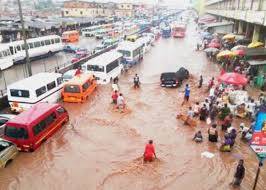Accra Floods & Poor Drainage Systems: When Rain Feels Like a Curse Instead of a Blessing
A few weeks ago, I found myself stranded in a taxi somewhere near Circle during one of Accra’s infamous downpours. You know the kind—where the sky turns charcoal grey in minutes, and before you can even think of looking for shelter, the roads are rivers and your shoes are floating somewhere behind you. That day, it hit me differently. Not just because I was wet and late, but because I started asking myself: Why are we always caught off guard by something that happens every year?
Honestly, it’s like déjà vu. Every rainy season, the news is flooded—pun intended—with videos of submerged cars, waist-deep water in people’s homes, and dramatic scenes of folks carrying kids on their backs, wading through what used to be streets. It’s heartbreaking. And frustrating. Especially because, deep down, we all kinda know the problem: poor drainage and terrible urban planning.
Accra’s drainage system is, in many places, non-existent—or just plain clogged. And let’s be real, we’ve all seen it. Gutters choked with sachet water bags, plastic bottles, and all sorts of junk that makes you wonder if people think the gutter is a second dustbin. I’m not pointing fingers—I’ve been guilty of tossing stuff where I shouldn’t. But still, how did we let it get this bad?
There’s also the construction mess. Buildings popping up in waterways like mushrooms after rain. Permits? Who knows. Enforcement? Barely there. Sometimes it feels like the whole city is just managing, held together with hope and concrete that wasn’t properly mixed. And I’m not even an engineer, but I’ve watched enough YouTube videos to know this ain’t normal.
In my experience, the conversation around Accra’s flooding problem only gets loud when disaster strikes. Then it fades. We move on. But for the people who lose their homes—or worse, loved ones—it doesn’t just "fade." It becomes a permanent mark on their lives. I remember a friend whose shop got completely ruined last year. All her stock was gone. Just like that. No insurance. No compensation. Just tears and a clean-up job that took weeks.
And here’s the wild thing: we’ve got the talent to fix this. Ghana is full of smart engineers, urban planners, and people who genuinely care. But red tape, politics, and corruption seem to drown every good idea. (I might be wrong, but it really feels that way.)
Maybe it’s time we started treating drainage like national infrastructure—not some afterthought. Roads shouldn’t double as rivers. Homes shouldn’t turn into swimming pools. Rain shouldn’t be a death sentence.
But how do we get there? Should we demand better from city authorities? Educate ourselves and others? Or maybe just start by not throwing that sachet into the gutter next time?
I don’t have all the answers. Heck, I don’t even know where my umbrella is half the time. But I do know this: something has to change. Because if we keep doing the same thing every year, we'll keep getting the same floods—and honestly, we’re all tired.
What if next year’s rainy season didn’t come with panic? What if we finally fixed what’s broken, not just patched it up? Wouldn’t that be something?
Just something to think about… while you’re stuck in traffic, watching the raindrops race down your window.



No comments yet
Be the first to share your thoughts!